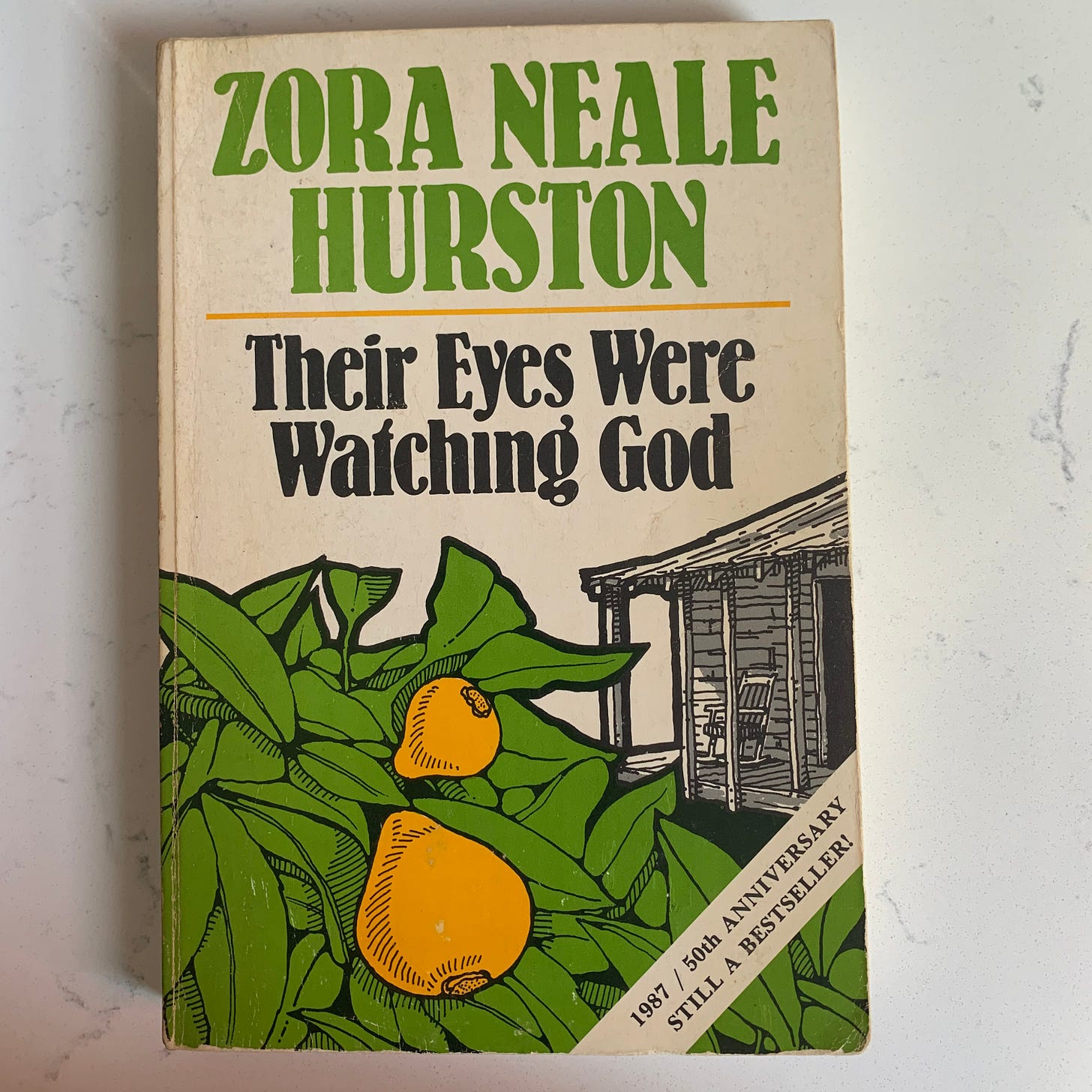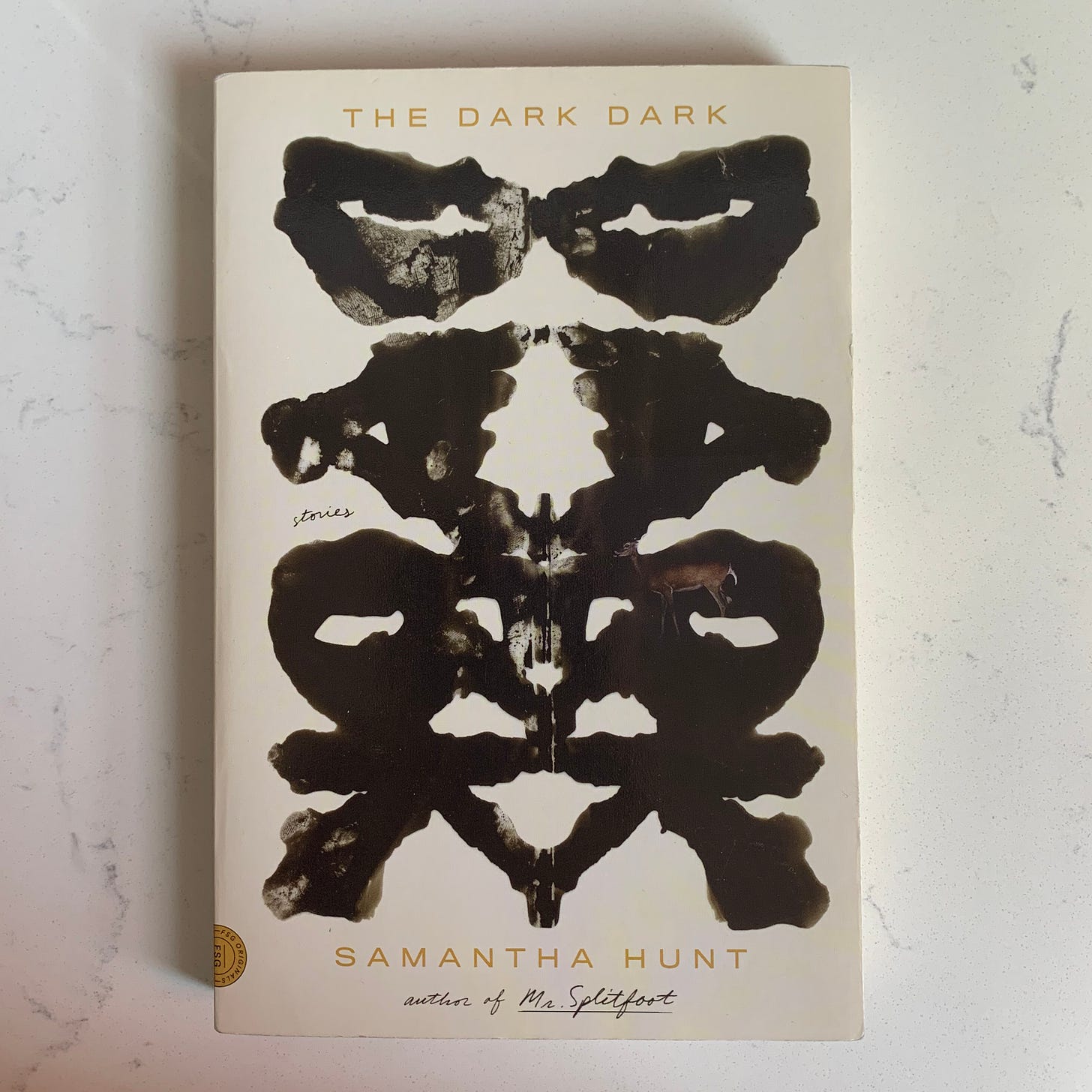'Their Eyes Were Watching God' by Zora Neale Hurston
'Somewhere up there beyond blue ether's bosom sat He. Was He noticing what was going on around here?' — Review #147
I know this is supposed to be Novella November, but sometimes I stretch the mandate a little bit and sneak in books that are slightly longer. This week, I’m completely fudging it because Zora Neale Hurston’s classic work is nearly 300 pages. I thought the book was far shorter when I set this month’s review lineup, and I had neither the time nor the inventory to replace it. I apologize for any confusion, but:
Longtime Books on GIF readers know that I’ve reviewed other Hurston books over the years, including ‘Barracoon: The Story of the Last “Black Cargo”’ earlier this year and ‘Moses, Man of the Mountain’ back in 2018. Those books are vital and engaging, and so is this one. Here’s the cover:
If you enjoy this review, click the ♥️ above. New here?
‘Their Eyes Were Watching God’ follows Janie, a black woman living in rural Florida. When Janie is a teenager, her grandmother, Nanny, arranges for her to be married to an older man with land and status. For Nanny, a former slave, the marriage is a way to secure Janie’s future since she has neither skills to provide for herself nor any other family to look out for her. But soon after Nanny dies, Janie runs off with another man, Joe Starks, who is embarking on an exciting plan to help build up a black-run town near Orlando. They marry, and once they arrive Starks sets up a general store, post office and gets the town organized. He is elected mayor. But their relationship sours. Instead of the independence and partnership Janie expected, Starks keeps her under his thumb and berates her when she makes mistakes in the store. After 20 years together, Starks dies. Shortly thereafter, Janie meets Tea Cake, a charming and sweet-talking fellow. She assumes at first that because she is pushing 40 and Tea Cake is 12 years younger, that he is after the money and property she inherited from Starks. But they eventually fall in love and leave town, landing in the Everglades to plant and pick beans on a white-owned farm. During her time with Tea Cake, Janie begins to taste the freedom and independence she had craved. Tea Cake teaches her to play checkers, and even to shoot guns. She discovers she’s a crack shot. She learns how to plant and work the fields, and is happy to not be sitting around at home cooking and cleaning or just waiting for her husband to come home. Eventually a hurricane destroys their idyll, which leads to a tragic and ironic ending that I won’t reveal here, but had me for hours after finishing the book feeling like:
While Janie’s story is compelling, I’m not sure her fate is the main takeaway from this book. I’m also not sure it’s supposed to be entirely about the oppression of black women in the Jim Crow South, although that is a very important aspect. The thing that I can’t stop thinking about is how this book is a rebuke of God, and how He (I’m using the male pronoun here because Hurston does) has allowed things like slavery, racism, misogyny and other injustices to exist while also sending terrible storms and taking those we love too soon. I underlined not only the passage in the subject line, but this one too: ‘All gods who receive homage are cruel. All gods dispense suffering without reason.’ I’m sure we have all felt this way in recent years as there have been plenty of reasons for feeling that God has abandoned us or is, at best, indifferent. But in Hurston’s rebuke is a note of hope. The idea of ‘watching’ God seems to imply that God might do something unexpected. Maybe He will inspire us toward good things, and to make the world a better and more just place for everybody. But until then, we’ll not only have to keep watch on God, but also on our society, like:
‘Their Eyes Were Watching God’ is written almost entirely in a ‘black dialect’ similar to what Hurston included in the two other books of hers that I’ve reviewed. I love her focus on presenting an authentic voice, and it makes for a beautiful and quick read. If you haven’t already, you should definitely read this book.
How it begins:
Ships at a distance have every man’s wish on board. For some they come in with the tide. For others they sail forever on the horizon, never out of sight, never landing until the Watcher turns his eyes away in resignation, his dreams mocked to death by Time. That is the life of men.
Now, women forget all those things they don’t want to remember, and remember everything they don’t want to forget. The dream is the truth. Then they act and do things accordingly.
So the beginning of this was a woman and she had come back from burying the dead. Not the dead of sick and ailing with friends at the pillow and the feet. She had come back from the sodden and the bloated; the sudden dead, their eyes flung wide open in judgment.
The people all saw her come because it was sundown. The sun was gone, but he had left his footprints in the sky. It was the time for sitting on porches beside the road. It was the time to hear things and talk. These sitters had been tongueless, earless, eyeless conveniences all day long. Mules and other brutes had occupied their skins. But now, the sun and the bossman were gone, so the skins felt powerful and human. They became lords of sounds and lesser things. They passed nations through their mouths. They sat in judgment.
My rating:
‘Their Eyes Were Watching God’ by Zora Neale Hurston was published by J.B. Lippincott Company in 1937. The Illini Books edition was published in 1978. 286 pages. $16.55 on Bookshop.org.
Disagree with my review? Let me know:
Up next:
Review #146: ‘Family Lexicon’ by Natalia Ginzburg
Support BoG: Twitter | Instagram | Goodreads
Contact me: booksongif@gmail.com.
Before you go:
Read this: Cartoonist Bob Eckstein checks in on how a handful of independent bookstores are faring in the pandemic. ‘Spare a Thought for the Indies’ in The New York Times includes great drawings of the shops, as well as an update on how they’re getting through. The owner of New York City’s Posman Books says his last sale was to an English tourist who bought Albert Camus’ ‘The Plague.’ After the sale, ‘We wished each other luck,’ he said. Remember to support independent bookstores this holiday season!
Do this: KGB Bar in Manhattan’s East Village is hosting a Virtual Homecoming Festival with a series of readings and events. On Tuesday, Nov. 17, Jonathan Franzen is speaking with Amity Gaige and John Brown at 7 p.m. Tickets are $12-$18.
Thanks for reading, and thanks especially to Donna for editing this newsletter!
Until next time,
MPV
Review #147 used GIFs from Giphy.com.
Books on GIF newsletters with most ♥️s












I read this in college and loved it, but I have little memory of it. I’m glad to hear it’s as good as I remember. Too bad I can’t go back in time and use your God theory in an English paper. I’m sure my prof would have been impressed.